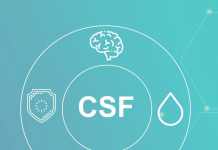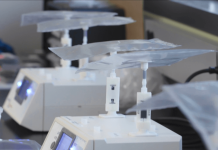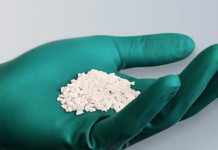Nalu Medical, Inc. (“Nalu”) a Carlsbad, California-based company that markets a minimally invasive neurostimulation implant for the management of chronic intractable pain for both Spinal Cord Stimulation (SCS) and Peripheral Nerve Stimulation (PNS) indications, announces the first patient enrollment in the Clinical Study Of A Micro-Implantable Pulse Generator For the Treatment of Peripheral Neuropathic Pain (COMFORT-2) Peripheral Nerve Stimulation Randomized Controlled Trial.
Together with COMFORT-1, COMFORT-2 is designed to enroll the largest cohort of randomized controlled trial subjects comparing the responder rate of PNS combined with conventional medical management versus the responder rate of conventional medical management alone.
In the United States, up to 8 million people suffer from peripheral neuropathic pain.1 The Nalu Neurostimulation System for PNS (Nalu PNS system) is FDA-cleared for pain management in adults who have severe intractable chronic pain of peripheral nerve origin, as the sole mitigating agent or as an adjunct to other modes of therapy used in a multidisciplinary approach. It offers long-term pain relief with an FDA-cleared serviceable life of 18 years.
The Nalu PNS system incorporates a battery-free, micro implantable pulse generator (micro-IPG™), powered by an externally worn device (Therapy Disc) housing the battery and controller. The system utilizes mild electrical pulses to create an energy field that acts to modulate the transmission of pain signals to the brain.
Dr. John Hatheway, interventional pain physician at Northwest Pain Care in Spokane, Washington, enrolled the first patient in the COMFORT-2 randomized controlled trial.
“I am thrilled to have enrolled the first patient in this important clinical trial. This is a significant milestone for our team and many clinicians who eagerly await empirical data to guide PNS treatment decisions,” said Dr. Hatheway. “I am confident that this trial will provide valuable insights into the safety and efficacy of this innovative therapy, and I look forward to continuing to work with Nalu Medical to advance this program and build Level 1 clinical evidence in the field of PNS.”
The COMFORT-2 randomized controlled trial will enroll up to 200 patients in up to 20 study centers in the U.S. Subjects who have been diagnosed with peripheral neuralgia, mononeuropathy, neuropathic pain, or osteoarthritis pain in the low back, shoulder, knee, or foot (including ankle) will be randomized to PNS combined with conventional treatments or conventional treatments alone.
The primary endpoints are responder rate at 3 months and the rate of serious and non-serious adverse events. Secondary endpoints include responder rates and the rate of serious and non-serious adverse events at 6 and 12 months, as well as patient-reported functional outcomes.
“This milestone marks an important step in clinically validating the efficacy of the Nalu PNS system for the long-term treatment of chronic intractable peripheral neuralgia of post-traumatic or post-surgical origin,” says Tom West, Nalu Medical CEO and President. “We are proud to lead the charge in building scientific evidence for PNS while growing our portfolio of Nalu PNS clinical outcomes. We are committed to being the leader in PNS clinical data development.”
This is the second PNS randomized controlled trial sponsored by Nalu Medical. An interim analysis of the COMFORT-1 study was presented at the American Society of Interventional Pain Physicians in March 2023. Preliminary data demonstrated 81% of patients in the treatment arm experienced ≥ 50% pain relief vs. 0% in the control arm.2 Additional COMFORT-1 interim analysis will be presented at the 5th Annual American Society of Pain and Neuroscience conference to be held in Miami, FL, from July 13-16, 2023.
About Nalu Medical
Nalu is a Carlsbad, California-based medical technology company focused on developing and commercializing innovative and minimally invasive solutions for patients with chronic neuropathic pain. The Nalu Neurostimulation System delivers gentle electrical pulses to the nervous system to modulate pain signals before they get to the brain. The Nalu System was designed to address major unmet needs in the treatment of chronic neuropathic pain and provide a differentiated value proposition for patients and physicians.
About the Nalu Neurostimulation System
The Nalu System consists of a fully featured, battery-free, miniaturized implantable pulse generator (IPG) that is powered wirelessly by an externally worn Therapy Disc and controlled through a smartphone-based remote-control app. Despite its small size, the Nalu micro-IPG™ delivers treatment capabilities similar to larger IPGs as well as unique advantages associated with advanced waveforms, extensive programming options, exceptional upgradability, and an expected service life of 18 years. The Nalu System has been repeatedly recognized for its revolutionary technology, including being named as one of the world’s top 100 new products by R&D Magazine in 2021. It is FDA-cleared for Spinal Cord Stimulation (SCS) and Peripheral Nerve Stimulation (PNS) indications. To learn more, visit www.nalumed.com.
Indications for Use
Spinal Cord Stimulation — The Nalu SCS System is indicated as the sole mitigating agent or as an adjunct to other modes of therapy used in a multidisciplinary approach for chronic intractable pain of the trunk and/or limbs, including unilateral or bilateral pain. The trial devices are solely used for trial stimulation (≤ 30 days) to determine efficacy before recommendation for a permanent (long-term) device.
Peripheral Nerve Stimulation — The Nalu PNS System is indicated for pain management in adults who have severe chronic intractable pain of peripheral nerve origin as the sole mitigating agent or as an adjunct to other modes of therapy used in a multidisciplinary approach. The Nalu Neurostimulation System for PNS is not intended to treat pain in the craniofacial region. The trial devices are solely used for trial stimulation (≤ 30 days) to determine efficacy before recommendation for a permanent (long-term) device.




